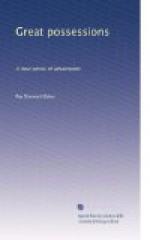As for the odour of the burning wastage of the fields at evening I scarcely know if I dare say it. I find it produces in the blood of me a kind of primitive emotion, as though it stirred memories older than my present life. Some drowsy cells of the brain awaken to a familiar stimulus—the odour of the lodge-fire of the savage, the wigwam of the Indian. Racial memories!
But it is not the time of the day, nor the turn of the season, nor yet the way of the wind that matters most but the ardour and glow we ourselves bring to the fragrant earth. It is a sad thing to reflect that in a world so overflowing with goodness of smell, of fine sights and sweet sounds, we pass by hastily and take so little of them. Days pass when we see no beautiful sight, hear no sweet sound, smell no memorable odour: when we exchange no single word of deeper understanding with a friend. We have lived a day and added nothing to our lives! A blind, grubbing, senseless life—that!
It is a strange thing, also, that instead of sharpening the tools by which we take hold of life we make studied efforts to dull them. We seem to fear life and early begin to stop our ears and close our eyes lest we hear and see too much: we clog our senses and cloud our minds. We seek dull security and ease and cease longer to desire adventure and struggle. And then—the tragedy of it—the poet we all have in us in youth begins to die, the philosopher in us dies, the martyr in us dies, so that the long, long time beyond youth with so many of us becomes a busy death. And this I think truer of men than of women: beyond forty many women just begin to awaken to power and beauty, but most men beyond that age go on dying. The task of the artist, whether poet, or musician, or painter, is to keep alive the perishing spirit of free adventure in men: to nourish the poet, the prophet, the martyr, we all have in us.
One’s sense of smell, like the sense of taste, is sharpest when he is hungry, and I am convinced also that one sees and hears best when unclogged with food, undulled with drink, undrugged with smoke. For me, also, weariness, though not exhaustion, seems to sharpen all the senses. Keenness goes with leanness. When I have been working hard or tramping the country roads in the open air and come in weary and hungry at night and catch the fragrance of the evening along the road or upon the hill, or at barn-doors smell the unmilked cows, or at the doorway, the comfortable odours of cooking supper how good that all is! At such times I know Esau to the core: the forthright, nature-loving, simple man he was, coming in dabbled with the blood of hunted animals and hungry for the steaming pottage.
It follows that if we take excessive joys of one sense, as of taste, nature, ever seeking just balances, deprives us of the full enjoyment of the others, “I am stuffed, cousin,” cries Beatrice in the play, “I cannot smell.” “I have drunk,” remarks the Clown in Arcady, “what are roses to me?” We forget that there are five chords in the great scale of life—sight, hearing, smell, taste, touch and—few of us ever master the chords well enough to get the full symphony of life, but are something like little pig-tailed girls playing Peter Piper with one finger while all the music of the universe is in the Great Instrument, and all to be had for the taking.




